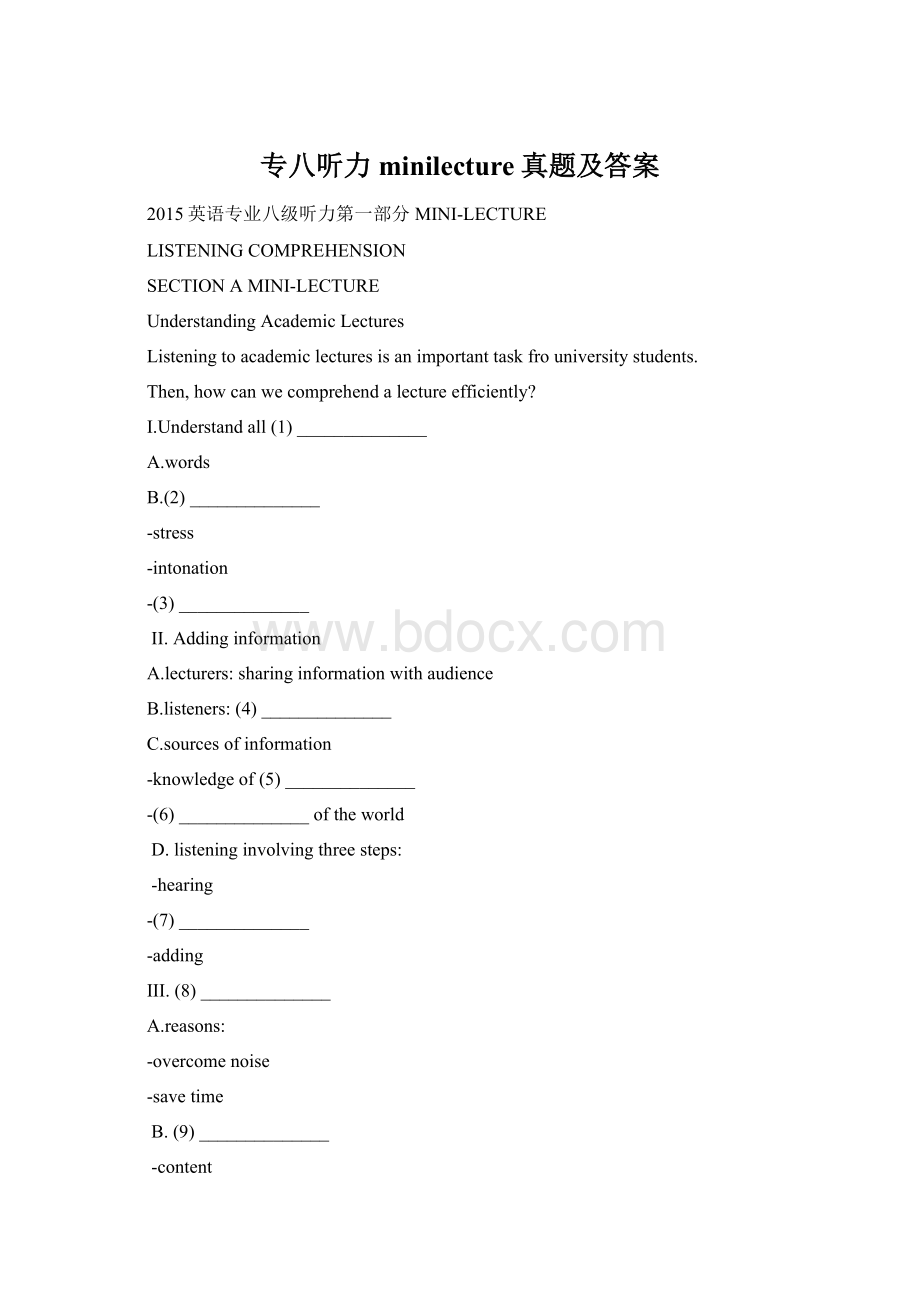专八听力minilecture真题及答案.docx
《专八听力minilecture真题及答案.docx》由会员分享,可在线阅读,更多相关《专八听力minilecture真题及答案.docx(14页珍藏版)》请在冰豆网上搜索。

专八听力minilecture真题及答案
2015英语专业八级听力第一部分MINI-LECTURE
LISTENINGCOMPREHENSION
SECTIONAMINI-LECTURE
UnderstandingAcademicLectures
Listeningtoacademiclecturesisanimportanttaskfrouniversitystudents.
Then,howcanwecomprehendalectureefficiently?
I.Understandall
(1)______________
A.words
B.
(2)______________
-stress
-intonation
-(3)______________
II.Addinginformation
A.lecturers:
sharinginformationwithaudience
B.listeners:
(4)______________
C.sourcesofinformation
-knowledgeof(5)______________
-(6)______________oftheworld
D.listeninginvolvingthreesteps:
-hearing
-(7)______________
-adding
III.(8)______________
A.reasons:
-overcomenoise
-savetime
B.(9)______________
-content
-organization
IV.Evaluatingwhilelistening
A.helpstodecidethe(10)______________ofnotes
B.helpstorememberinformation
答案:
1.partsofmeanings2.sound/vocalfeatures3.rhythm4.absorbing5.subject6.experience7.reinterpreting8.prediction9.whattolisten10.Importance
2015
2014
ANSWERSHEET1(TEM8)
PARTILISTENINGCOMPREHENSIONSECTIONAMINI-LECTURE
HowtoReduceStress
Lifeisfullofthingsthatcauseusstress.Thoughwemaynotlikestress,wehavetolivewithit.I.DefinitionofstressA.
(1)reaction
(1)physicali.e.forceexertedbetweentwotouchingbodiesB.humanreaction
i.e.responseto
(2)onsomeone
(2)ademande.g.increaseinbreathing,heartrate,(3)(3)bloodpressureormuscletension
II.(4)(4)CategoryofstressA.positivestress
—whereitoccurs:
Christmas,wedding,(5)(5)ajobB.negativestress
—whereitoccurs:
test-takingsituations,friend’sdeathIII.WaystocopewithstressA.recognitionofstresssignals
—monitorfor(6)ofstress(6)signals—findwaystoprotectoneselfB.attentiontobodydemand
—effectof(7)(7)exerciseandnutritionC.planningandactingappropriately—reasonforplanning—(8)ofplanning(8)resultD.learningto(9)(9)accept—e.g.delaycausedbytrafficE.pacingactivities
—manageabletask—(10)(10)reasonablespeed
2013
SECTIONAMINI-LECTURE
WhatDoActiveLearnersDo?
Therearedifferencebetweenactivelearningandpassivelearning.
Characteristicsofactivelearners:
I.readingwithpurposes
A.beforereading:
settinggoals
B.whilereading:
(1)________
II.
(2)______andcriticalinthinking
i.e.informationprocessing,e.g.
--connectionsbetweentheknownandthenewinformation
--identificationof(3)______concepts
--judgmentonthevalueof(4)_____.
III.activeinlistening
A.waysofnote-taking:
(5)_______.
B.beforenote-taking:
listeningandthinking
IV.beingabletogetassistance
A.reason1:
knowingcomprehensionproblemsbecauseof(6)______.
B.Reason2:
beingabletopredictstudydifficulties
V.beingabletoquestioninformation
A.questionwhattheyreadorhear
B.evaluateand(7)______.
VI.Lastcharacteristic
A.attitudetowardresponsibility
--activelearners:
accept
--passivelearners:
(8)_______
B.attitudetoward(9)______
--activelearners:
evaluateandchangebehaviour
--passivelearners:
nochangeinapproach
Relationshipbetweenskillandwill:
willismoreimportantin(10)______.
Lackofwillleadstodifficultyincollegelearning.
参考答案:
1.checkingtheirunderstanding
2.reflectiveoninformation
3.incomprehensible
4.whatyouread
5.organized
6.monitoringtheirunderstanding
7.differentiate
8.blame
9.performance
10.activelearning
SectionAMini-lecture
或者
1、checkingunderstanding。
2、reflective
3、puzzling/confusing
4、whatisread
5、comprehensiveandorganized
6、constantunderstandingmonitoring//monitoringtheirunderstanding
7、differ
8、blameothers
9、poorperformance
10、schoolwork//studies
2012
Observation
Peopledoobservationindailylifecontextforsafetyorforproperbehaviour.However,therearedifferencesindailylifeobservationandresearchobservation.
Differences
----dailylifeobservation
--casual
--
(1)________
--dependenceonmemory
----researchobservation
--
(2)_________
--carefulrecordkeeping
B.Waystoselectsamplesinresearch
----timesampling
--systematic:
e.g.fixedintervalseveryhour
--random:
fixedintervalsbut(3)_______
Systematicsamplingandrandomsamplingareoftenusedincombination.
----(4)_______
--definition:
selectionofdifferentlocations
--reason:
humans’oranimals’behaviour(5)______acrosscircumstances
--(6)______:
moreobjectiveobservations
C.Waystorecordbehaviour(7)_______
----observationwithintervention
--participantobservation:
researcherasobserverandparticipant
--fieldexperiment:
research(8)______overconditions
----observationwithoutintervention
--purpose:
describingbehaviour(9)______
--(10)______:
nointervention
--researcher:
apassiverecorder
1:
rarelyformalrecords2:
systematicobjectivemanner3:
variable
4:
situationsampling5:
vary6:
advantage7:
asitoccurs8:
havemorecontrol9:
innaturalsetting10:
methodInterview
2011
ClassificationsofCultures
AccordingtoEdwardHall,differentculturesresultindifferentideasabouttheworld.Hallisananthropologist.Heisinterestedinrelationsbetweencultures.
I.High-contextcultureA.feature
-context:
moreimportantthanthemessage
-meaning:
(1)__________
i.e.moreattentionpaidto
(2)___________thantothemessageitself
B.examples
-personalspace
-preferencefor(3)__________
-lessrespectforprivacy/personalspace
-attentionto(4)___________
-conceptoftime
-beliefin(5)____________interpretationoftime
-noconcernforpunctuality
-nocontrolovertime
II.Low-contextculture
A.feature
-message:
separatefromcontext
-meaning:
(6)___________
B.examples
-personalspace
-desire/respectforindividuality/privacy
-lessattentiontobodylanguage
-moreconcernfor(7)___________
-attitudetowardtime
-conceptoftime:
(8)____________
-dislikeof(9)_____________
-timeseenascommodity
III.Conclusion
Awarenessofdifferentculturalassumptions
-relevanceinworkandlife
e.g.business,negotiation,etc.
-(10)_____________insuccessfulcommunication
1.apartfromthemessage2.whatishappening3.closeness4.bodylanguage5.multiple6.initself7.themessageitself8.punctualitymeanseverything9.lateness10.accounts
1.andsignificance
2.thecontext或whatisdoing3.closenesstopeople4.bodylanguage5.polychronic6.initself
7.personalspace8.monochrome9.lateness
10.multiculturalsituation
2010
ParalinguisticFeaturesofLanguage
Inface-to-facecommunicationspeakersoftenaltertheirtomesofvoiceorchangetheirphysicalposturesinordertoconveymessages.Thesemeansarecalledparalinguisticfeaturesoflanguage,whichfallintotwocategories.
Firstcategory:
vocalparalinguisticfeatures
(1)__________:
toexpressattitudeorintention
(1)__________
Examples
1.whispering:
needforsecrecy
2.breathiness:
deepemotion
3.
(2)_________:
unimportance
(2)__________
4.nasality:
anxiety
5.extralip-rounding:
greaterintimacy
Secondcategory:
physicalparalinguisticfeatures
facialexpressions
(3)_______(3)__________
-----smiling:
signalofpleasureorwelcome
lesscommonexpressions
-----eyebrowraising:
surpriseorinterest
-----lipbiting:
(4)________(4)_________
gesture
gesturesarerelatedtoculture.
Britishculture
-----shruggingshoulders:
(5)________(5)__________
-----scratchinghead:
puzzlement
othercultures
-----placinghanduponheart:
(6)_______(6)__________
-----pointingatnose:
secret
proximity,postureandechoing
proximity:
physicaldistancebetweenspeakers
-----closeness:
intimacyorthreat
-----(7)_______:
formalityorabsenceofinterest(7)_________
Proximityisperson-,culture-and(8)________-specific.(8)_________
posture
-----hunchedshouldersorahanginghead:
toindicate(9)_____(9)________
-----directleveleyecontact:
toexpressanopenorchallengingattitude
echoing
-----definition:
imitationofsimilarposture
-----(10)______:
aidincommunication(10)___________
-----consciousimitation:
mockery
1tonesofvoice2huskiness3universalsignal。
4thoughtoruncertainty5indifference6honesty7distance。
8situation。
9mood。
10unconsciouslysameposture
2009
WritingExperimentalReports
I.Contentofanexperimentalreport,e.g.
---studysubject/area
---studypurpose
---____1____
II.Presentationofanexperimentalreport
---providingdetails
---regardingreadersas_____2_____
III.Structureofanexperimentalreport
---feature:
highlystructuredand____3____
---sectionsandtheircontent:
INTRODUCTION____4____。
whyyoudidit
METHODhowyoudidit
RESULTwhatyoufoundout
____5____whatyouthinkitshows
IV.Senseofreadership
---____6____:
readeristhemarker
---____7____:
readerisanidealized,hypothetical,intelligentpersonwithlittleknowledgeofyourstudy
---taskstofulfillinanexperimentalreport:
introductiontorelevantarea
necessarybackgroundinformation
developmentofcleararguments
definitionoftechnicalterms
precisedescriptionofdata____8____
V.Demandsandexpectationsinreportwriting
---earlystage:
understandingofstudysubject/areaanditsimplications
basicgraspofthereport'sformat
---laterstage:
____9____onresearchsignificance
---thingstoavoidinwritingINTRODUCTION:
Inadequatematerial
____10____ofresearchjustificationforthestudy
MINI-LECTURE
1.Studyresult/findings2.Audience3.Disciplined4.whatyoudid5.DISCUSSION6.acommonmistake7.inreality8.obtained/thatyouobtained9.attention/foucs/empha